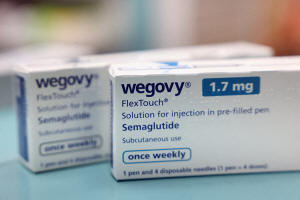Genetic profile may predict best response to weight-loss drug Wegovy
 Send a link to a friend
Send a link to a friend
 [May 20, 2024]
By Nancy Lapid [May 20, 2024]
By Nancy Lapid
(Reuters) - Certain genes may identify patients with obesity who are
most likely to respond strongly to Novo Nordisk's weight-loss drug
Wegovy, researchers reported on Monday.
The study, released at the Digestive Disease Week meeting in Washington,
found a 95% likelihood that patients with this genetic profile would be
strong responders to the treatment.
Given the expense of Wegovy, the findings might be used to identify the
patients most likely to get the greatest benefit from it, according to
Dr. Andres Acosta of the Mayo Clinic in Rochester, Minnesota, one of the
researchers.
Some people with obesity have a genetic profile that contributes to what
is called a "hungry gut" - that is, they feel full during a meal but
become hungry again shortly afterward because food leaves their stomach
more quickly than in most other people, Acosta said.

The study involved 84 patients prescribed Wegovy for treatment of
obesity. Those with the genetic variants associated with "hungry gut"
lost an average of 14.4% of their total body weight after nine months on
the drug and 19.5% after a year, the study found.
By comparison, study participants without this genetic profile lost
10.3% of their body weight after nine months and nothing more by 12
months.
Acosta said the researchers previously saw a similar pattern in patients
taking the weight-loss drug liraglutide, which is marketed under the
names Victoza and Saxenda by Novo Nordisk.
[to top of second column]
|

Boxes of Wegovy made by Novo Nordisk are seen at a pharmacy in
London, Britain March 8, 2024. REUTERS/Hollie Adams/File Photo
 While patients without the "hungry
gut" genes did lose some weight on Wegovy, they might be able to
lose similar amounts with less-expensive therapies, Acosta said. The
list price for Wegovy, also called semaglutide, is $1,349.02 per
month.
"When you're going to spend this much money," Acosta said, "you have
to ask, 'Is there a cheaper approach that will yield the same
results in some patients, maybe other medications or surgery?'"
Larger studies are needed to assess the reliability of the "hungry
gut" genetic profile in more diverse populations, the researchers
said.
If the new results are confirmed, Acosta said, doctors can finally
tell some of their patients, "'We know why you are struggling with
obesity,' and we can say with confidence, 'This expensive drug will
help you,' or, 'Hey, this might not be for you.'"
(Reporting by Nancy Lapid; editing by Michele Gershberg and Will
Dunham)
[© 2024 Thomson Reuters. All rights reserved.]This material may not be published,
broadcast, rewritten or redistributed.
Thompson Reuters is solely responsible for this content.
 |